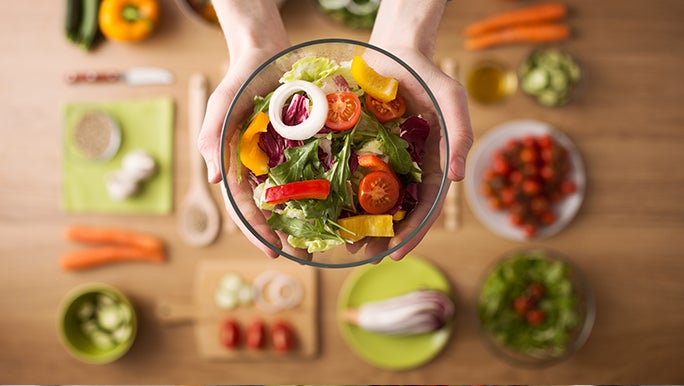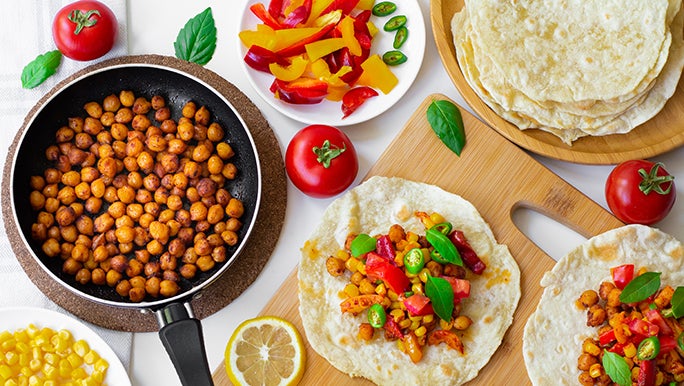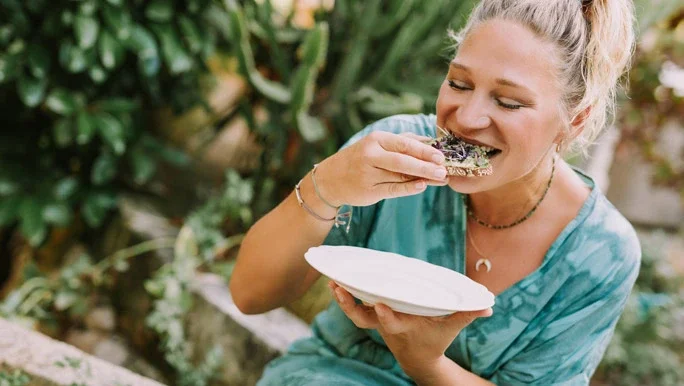Key points
- David Attenborough is a well known animal lover, but he doesn’t follow a strict vegan diet.
- Chicken salt is generally vegan, but always read the ingredients list for the brand you’re buying as it may contain animal products.
- Honey isn’t generally considered vegan friendly.
- There’s vegan-friendly alternatives to silk that don't involve silkworms.
Considering switching to veganism and want to know if you’ll have to give up your favourite hot chip topping? Curious about the vegan lifestyle? Wondering if the world’s most well known animal lover eats animal products?
Well, read on because you’ll find the answers to your most burning vegan questions. Plus, we asked dietician Simone Austin to share her insights into what people generally want to know about veganism and nutrition.
Is David Attenborough a vegan?
You might be surprised to learn that no, David Attenborough does not follow a vegan diet. That’s to say he doesn’t follow a strict vegan or vegetarian diet.
While he doesn’t completely abstain from animal products, he admits that he doesn’t eat much meat but does eat cheese and fish. It’s likely that he’s probably vegetarian or flexitarian.
So, if you’re wondering how to encourage your child to eat vegetables, maybe telling them that Sir David is a veggie lover could help? It’s worth a try, right?

Many people considering a vegan diet are worried about what nutrients they’re going to miss out on.
Is chicken salt vegan?
The short answer is yes, chicken salt is generally vegan. It doesn’t contain any chicken but rather a mix of herbs and spices plus salt.
But this comes with a caveat – always read the ingredients list for the brand you’re buying as it may contain animal products.
The good news for vegans is that if you love chicken salt, you can still indulge!

You might be surprised to learn that no, David Attenborough is not a vegan.
Can you eat honey if you’re following a vegan diet?
The buzz on this one is that no, honey generally isn’t considered to be vegan-friendly.
Why? There’s a few reasons.
Firstly, many people who follow a vegan diet consider that taking honey from a beehive is cruel because it’s removing the bee’s food source. There’s also a concern amongst vegans about unethical bee farming practices and the exploitation of bees to produce honey.
One of the big plant based and vegan differences comes down to these concerns about animal welfare and the environment. You could eat honey and still follow a plant based diet.

Make sure to eat legumes and other foods rich in iron such as the green leafy vegetables in season.
Can you wear silk if you’re following a vegan diet?
No, people who follow a vegan diet don’t wear silk made using traditional methods, e.g., from the cocoon of silkworms. That’s because the silkworms are killed in order to keep their cocoon intact so it’s easier to spin into yarn. This goes against the vegan philosophy of no cruelty to animals.
There are vegan-friendly alternatives to silk with fibres made from things like orange husks, bamboo, lotus or even from fermented yeast, water and sugar.
What nutrients are important for people who follow a vegan diet to consider?
According to dietitian Simone Austin, one of the most common vegan questions she is asked is “What nutrients do I need if I’m a vegan?”
“Many people considering a vegan diet are worried about what nutrients they’re going to miss out on. They’re concerned about whether they will get enough iron and how to eat enough high protein vegan foods. They’re also conscious of how many servings of vegetables per day they’re eating,” Simone says.
She further explains, “That’s when we would talk about legumes and eating foods rich in iron such as the green leafy vegetables in season. With any processed foods you should also look at the ingredients as the salt content may be quite high in this type of food as well as preservatives and additives.”
Curiosity is a great place to start
Maybe you’re wondering whether a vegetarian diet reduces inflammation? Or if going vegan is the right choice for you? Either way, a curious mind is always a good thing.
Ask questions and speak to your health professional to help make the right decisions for you and your family.
Related:
Simone Austin is an accredited Practising Dietitian, an Advanced Sports Dietitian and President of Sports Dietitians Australia. Her passion for optimising sports performance and health through nutrition has led Simone through her 25+ year career working with some of Australia’s top sports teams.
Reviewed by the healthylife Advisory Board October 2021.



